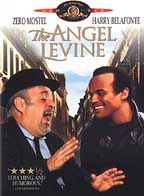
THE ANGEL LEVINE
US, 1970, 105 minutes, Colour.
Zero Mostel, Harry Belafonte, Ida Kaminska, Milo O’ Shea, Gloria Foster, Eli Wallach, Anne Jackson.
Directed by Jan Kadar.
The Angel Levine is a fable set in New York City. Zero Mostel portrays Morris Mischkin, an elderly religious Jew whose wife Fanny, Ida Kaminska, is ill. Although he is a tailor, his back prevents him from working so he is desperate. Suddenly an angel appears in his kitchen. The angel is both black and Jewish – and is played by Harry Belafonte. The angel promises all kinds of answers to prayer for Morris Mischkin.
The film was based on the story by Bernard Malamud (whose novels The Fixer, The Natural and The Assistant were also filmed).
The film is in the tradition of the fables in Jewish culture from eastern Europe. The director is Jan Kadar, a Czech Jewish director who began making films in Czechoslovakia at the end of World War Two. However, during the difficulties in Czechoslovakia in 1968 with the Russian tanks putting down the Spring Revolution, he migrated, as did Milos Forman and Ivan Passer, to the United States. He did not make many films there but made this one and Lies My Father Told Me as well as Freedom Road. He was celebrated in Czechoslovakia, especially with his 1965 film The Shop on the Main Street (which also starred Ida Kaminska).
The film is very much geared to a Jewish audience – but with the tongue-in-cheek humour, the religious dimensions, it is a film which appeals beyond its Jewish audience.
1. How entertaining a film? Was it too serious in its purpose? How limited in it Jewish appeal? Too difficult to follow its meaning? Or did it entertain despite this?
2. How was the film a parable about modern living? How was it an allegory of human life? How did the film communicate to the audience the parable and allegorical nature of the film?
3. How enjoyable would this film be to Jewish audiences? Why? How much Jewish background did it presuppose? Despite the Jewish background, did it still have universal meaning and appeal? Why? About people, their need for redemption, refusal of grace, the reality of death?
4. How well did the film blend reality and fantasy? The fact of Morris' dream? The reality of Levine's death? The use of colour and black and white? The interweaving of reality and fantasy, of dream and waking? What message for the audience?
5. How important was Morris as the central character? What kind of man was he? As ageing, as Jewish, as hard, his relationship to his wife and daughter, his selfishness, his needs, his needing to be redeemed, his friendship with the doctor, his refusal of grace his sceptic attitudes, the possibility that he could change, the fact that he could welcome grace in his life? How did the reality of the stranger's death affect him? How did his wife's dying affect him? The impact of the dream and its meaning on his life? What was he finally searching for?
6. The importance of Morris' wife, that she was a good person, contrasting with him, the fact that she was dying, her response to goodness and grace, the fact that she could receive grace and life, that she could give life in her death, that she was a redeeming figure? What was the meaning of her death? Its affect on Morris?
7. Alexander Levine, reality or fantasy? That he claimed to be and angel? What kind of angel was he? What did angel mean in this context? What kind of person was he in real life? His dying as we saw it, the fact that he should dead, the purgatorial nature of his experience, his chance to be redeemed? His wanting to do good, his wanting to do the things than he did in real life? Why was he unable to free himself of the past, his despair, his appeals to Morris and his offering of natuation to him (how comical, how serious?) The encounter with Gloria and his inability to be redeemed, the fact that happiness seemed to elude him? The influence of Morris' wife? His final redemption? The fact that he was a grace and Morris needed to see for him?
8. The importance of Gloria in the film, her relationship to Alex, her response to him as dead, her refusal to help him?
9. The function of the doctor in the film? As friend to Morris? His role in reality supporting Morris and his wife? His function in the dream and response to Alex and Morris?
10. What did the film have to say about the possibilities of transformation in life? Morris' reaction when he awoke and found he was not redeemed? And yet the fact of relentless need for grace? The meaning of his final wandering and search?
11. The technique of Alex still being present? Is this fair? Is it too much of a trick? Does it leave an air of mystery and mysticism about the film?
12. How religious a film? How valuable for the meaning of life and death? How humorous, how serious? How moving?